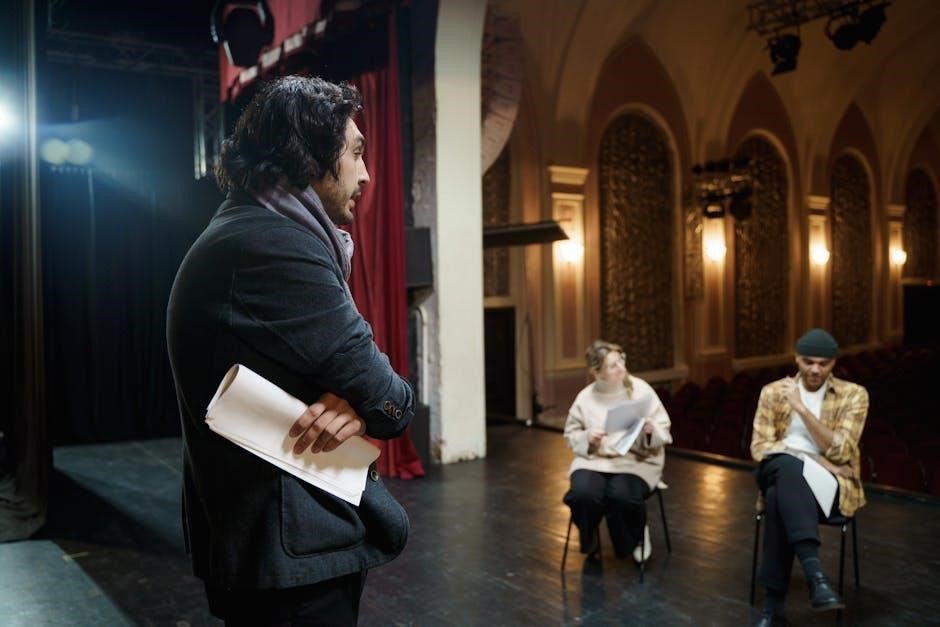fair play script pdf
Summary
Download the Fair Play Script PDF for free! Get instant access from Water Boosting Systems.

Explore the world of fair play scripts in PDF format, offering insights into themes like gender dynamics, career challenges, and relationship struggles through engaging narratives and thought-provoking dialogue.

Origins of Fair Play
The concept of fair play has evolved across various mediums, from literature to film, exploring themes of equality and justice in personal and professional relationships. Originating in Eve Rodsky’s book Fair Play, the idea addresses the unequal distribution of unpaid labor, sparking conversations about gender dynamics and career challenges. The term gained further prominence with Chloe Domont’s film Fair Play, which delves into the tensions arising from power imbalances in a relationship. Both works highlight the struggle for fairness in modern society, inspiring adaptations and interpretations across different formats. The script of Fair Play reflects these origins, blending realistic dialogue with a gripping narrative that examines the complexities of partnerships and ambition. By exploring these themes, the story resonates with audiences seeking equitable solutions in their own lives.
The Book “Fair Play” by Eve Rodsky
Eve Rodsky’s Fair Play is a groundbreaking book that explores the unequal distribution of unpaid labor in relationships, offering a revolutionary solution to achieve balance. Rodsky introduces the concept of a “Fair Play” game, where partners allocate tasks and responsibilities fairly, fostering equality and reducing resentment. The book provides practical tools and frameworks to redefine domestic responsibilities, ensuring both partners contribute equally to household and caregiving duties. By addressing systemic gender dynamics, Fair Play has become a vital resource for modern couples seeking equitable partnerships. Its insights have resonated widely, inspiring conversations about fairness in relationships and career challenges. The book’s innovative approach has made it a must-read for anyone striving to create a more balanced and harmonious home life.

The Film “Fair Play” by Chloe Domont
Directed by Chloe Domont, Fair Play is a gripping film that delves into the complexities of relationships, career ambition, and power dynamics. The story follows Emily (Phoebe Dynevor) and Luke (Alden Ehrenreich), two colleagues in a secret relationship whose bond is strained when Emily receives a high-stakes promotion at a ruthless hedge fund. As Emily’s career ascends, tensions rise, threatening their engagement and future together. The film explores themes of gender dynamics, career challenges, and relationship struggles, offering a nuanced portrayal of modern professional and personal life. With its sharp dialogue and intense performances, Fair Play has garnered attention for its unflinching look at inequality and ambition. Premiering at the Sundance Film Festival, it has sparked conversations about fairness and equality in both personal and professional contexts.

The Script Itself
The Fair Play script is available in PDF format, offering a detailed exploration of themes like gender dynamics, career challenges, and relationship struggles through engaging dialogue and intense character development.
Plot Synopsis
The Fair Play script delves into the intricate dynamics of a relationship strained by professional ambition. Emily and Luke, co-workers in a cutthroat hedge fund, navigate their secret romance until Emily’s promotion disrupts their balance. As Emily rises through the ranks, tensions escalate, threatening their engagement and future together. Set against the backdrop of New York City’s fast-paced financial world, the story explores themes of power, loyalty, and the challenges of maintaining a relationship in a competitive environment. The plot unfolds with intense dialogue and emotional depth, highlighting the struggles of balancing personal and professional lives. The script examines how success can both unite and divide, offering a gripping narrative of love and ambition in a high-stakes setting.
Main Characters
The Fair Play script centers around two primary characters, Emily and Luke, whose relationship is tested by professional and personal challenges. Emily, portrayed as ambitious and driven, navigates a high-stakes career in a ruthless hedge fund, while Luke struggles with his own identity and insecurities. Their dynamic shifts when Emily’s promotion creates tension, highlighting themes of power, loyalty, and equality in their relationship. Supporting characters, including colleagues and family members, add depth to the narrative, exploring how external pressures influence their bond. The script focuses on the emotional and psychological struggles of these characters, offering a nuanced portrayal of modern relationships and the challenges of balancing personal and professional ambitions. Through their interactions, the story examines the complexities of love, ambition, and fairness in a competitive world.
Emily
Emily is a central character in the Fair Play script, portrayed as a driven and ambitious individual navigating a high-stakes career in a ruthless hedge fund. Her promotion sparks tension in her relationship with Luke, as her success challenges the dynamics of their partnership. Emily’s character represents the struggles of modern women balancing professional ambition and personal life, often facing systemic inequalities. Her journey explores themes of identity, power, and the pressures of conforming to societal expectations. Through her interactions, the script delves into the emotional and psychological toll of competing demands, highlighting her resilience and vulnerability. Emily’s character serves as a catalyst for examining broader gender dynamics and the challenges of maintaining fairness in relationships. Her story is both relatable and thought-provoking, offering insights into contemporary societal issues.
Luke
Luke, portrayed by Alden Ehrenreich, is Emily’s partner and a key figure in the Fair Play script. His character embodies a mix of charm, ambition, and vulnerability, as he navigates the challenges of their relationship. Luke’s journey explores themes of masculinity, jealousy, and insecurity, particularly as he struggles with Emily’s professional ascent. His role highlights the complexities of modern partnerships, where traditional dynamics are tested by shifting power balances. Luke’s interactions with Emily reveal his emotional depth, showcasing his desire for equality and understanding. The script delves into his internal conflicts, offering a nuanced portrayal of a man grappling with change. Through Luke’s character, the story examines the societal pressures on men and the evolving definitions of partnership in contemporary relationships. His narrative serves as a counterpoint to Emily’s, enriching the exploration of fairness and balance.
Themes
The Fair Play script delves into several compelling themes, including gender dynamics, career challenges, and relationship struggles. These themes are intricately woven into the narrative, exploring the complexities of modern partnerships and the societal expectations placed on individuals. The script examines how power imbalances and shifting roles can strain relationships, particularly in professional settings. It also highlights the tension between personal ambition and shared goals, raising questions about fairness and equality. Through its characters’ experiences, the story sheds light on the challenges of maintaining trust and communication in the face of external pressures. The themes are universal, resonating with audiences who navigate similar struggles in their own lives. The script’s exploration of these issues offers a nuanced commentary on contemporary relationships and the ongoing pursuit of balance.
Gender Dynamics
Gender dynamics play a central role in the Fair Play script, particularly through the lens of Emily and Luke’s relationship. The story explores the societal expectations placed on women in professional and personal spheres, highlighting the challenges of navigating a male-dominated industry. Emily’s ascent in her career sparks tension, as her success threatens traditional power structures within their partnership. The script examines how gender roles influence decision-making, trust, and communication. It also delves into the emotional labor often disproportionately shouldered by women, mirroring real-world struggles. Through these dynamics, the narrative raises important questions about equality, fairness, and the evolving roles of men and women in modern relationships. The portrayal of these themes is both nuanced and thought-provoking, offering a relatable commentary on contemporary gender issues.
Career Challenges
The Fair Play script delves into the career challenges faced by Emily, a young professional in a ruthless hedge fund environment. Her unexpected promotion creates tension, as she navigates a cutthroat industry while balancing her personal life. The script highlights the pressures of ambition, the sacrifices required for success, and the strain it places on relationships. Emily’s ascent sparks jealousy and insecurity in Luke, her partner, who struggles to reconcile her growing professional stature with their personal dynamic. The narrative explores themes of competition, identity, and the challenges of maintaining a relationship in a high-stakes career environment. Through Emily’s journey, the script sheds light on the difficulties women face in male-dominated industries and the personal costs of achieving success. These career challenges serve as a catalyst for the broader exploration of power dynamics and fairness in the story.
Relationship Struggles
The Fair Play script intricately explores the relationship struggles between Emily and Luke, a couple navigating a secret romance amidst professional pressures. Emily’s promotion in the cutthroat hedge fund world creates tension, as her success threatens their dynamic. The script portrays the emotional toll of ambition on intimacy, as trust and communication begin to fray. Luke’s insecurities surface, and the power balance in their relationship shifts, leading to conflicts and misunderstandings. The narrative delves into the challenges of maintaining a partnership when professional and personal aspirations collide. Through their struggles, the script examines themes of jealousy, identity, and the difficulty of sustaining love in a high-pressure environment. These relationship struggles serve as the emotional core of the story, highlighting the fragility of connections in the face of ambition and societal expectations. The script offers a raw, unfiltered look at modern relationship dynamics.
Setting
The Fair Play script is set in a high-stakes corporate environment, primarily within a ruthless hedge fund. The story unfolds in modern-day New York City, where the cutthroat world of finance dominates the characters’ lives. The setting also includes intimate personal spaces, such as Emily and Luke’s home, where their relationship struggles play out. Additionally, key scenes take place at a wedding party, where the tension between the couple is palpable. The contrast between the polished, competitive office and the emotional private spaces highlights the characters’ inner conflicts. The setting reflects the fast-paced, demanding nature of their careers, which directly impacts their relationship dynamics. The hedge fund’s oppressive atmosphere serves as a backdrop for the power struggles and emotional battles that define the story. The script’s setting is both a physical and emotional landscape, shaping the characters’ choices and interactions.
Dialogue and Style
The dialogue in Fair Play is sharp and emotionally charged, reflecting the tension and power dynamics between Emily and Luke. Conversations often feel like verbal sparring matches, with each character trying to assert control or justify their actions. The script’s style is cinematic and contemporary, with a focus on realism that makes the characters’ struggles relatable. The dialogue also reveals deeper societal themes, such as gender roles and career pressures, through subtle exchanges. Scene descriptions are concise but vivid, painting a clear picture of the high-stakes hedge fund environment and the intimate personal spaces where the relationship unfolds. The script’s tone shifts seamlessly from professional banter to raw emotional confrontations, creating a dynamic narrative that keeps the audience engaged. The dialogue and style work together to highlight the characters’ emotional journeys and the societal challenges they face.
Symbolism
The Fair Play script is rich in symbolism, with elements that reflect the characters’ emotional and societal struggles. Emily’s cigarette, for instance, symbolizes her stress and rebellion against the constraints of her role. The hedge fund’s high-stakes environment represents the cutthroat nature of professional ambition and gender inequality. The cityscape serves as a backdrop for their emotional distance, while the wedding party at the beginning symbolizes the societal expectations they are trying to navigate. The script also uses subtle visual cues, like the contrast between the opulent wedding setting and the cramped, tense spaces where Emily and Luke argue, to highlight the disparity between their public facade and private reality. These symbols underscore the themes of power dynamics, identity, and the struggle for fairness in both personal and professional realms.

Availability of Fair Play Scripts Online
Fair Play scripts are widely available online in PDF format, offering easy access to readers and performers. Platforms like ProPlay and Scripts.com provide free scripts, enabling users to download and review them instantly. Many websites allow scripts to be modified for personal use, with the condition of acknowledging the original author. This accessibility has made it simpler for individuals to engage with the themes and narratives of Fair Play, fostering a broader discussion on gender dynamics and career challenges. Additionally, some scripts are accompanied by options to purchase bound copies, though this is not mandatory. The digital age has truly democratized access to such creative works, ensuring that Fair Play reaches a global audience effortlessly.

Popular Platforms for Downloading Fair Play Scripts
Several platforms offer easy access to Fair Play scripts in PDF format. ProPlay is a premier site for professionally-produced stage plays, allowing free reading and downloading. Scripts.com also provides a wide range of scripts, including Fair Play, with options for instant downloads. Additionally, Scribd hosts various versions of the script, enabling users to access and share them effortlessly. These platforms cater to both casual readers and performers, ensuring that the themes of gender dynamics, career challenges, and relationship struggles reach a broad audience. With just a few clicks, users can explore the nuanced narratives and thought-provoking dialogue of Fair Play from the comfort of their devices.

How to Download and Use Fair Play Scripts
Downloading and using Fair Play scripts in PDF format is straightforward. Platforms like ProPlay and Scripts.com offer free access to these scripts, allowing users to download them instantly. Many scripts are available in both PDF and Microsoft Word formats, providing flexibility for editing or printing. To download, simply browse the platform, select the desired script, and follow the prompts to save it to your device. Once downloaded, the script can be used for personal reading, educational purposes, or even performances, as many scripts are licensable. Ensure to acknowledge the author when using or adapting the material, as required by the platform. This accessibility makes Fair Play scripts a valuable resource for exploring themes like gender dynamics and career challenges in a convenient digital format.
Cultural and Social Impact of Fair Play
The Fair Play script has sparked significant cultural and social conversations, particularly around gender dynamics and career challenges. By addressing systemic inequalities, it encourages equitable solutions in both personal and professional contexts. The narrative resonates with audiences, fostering dialogue about unseen labor and relationship struggles. Its exploration of power imbalances has made it a catalyst for change, inspiring individuals to reevaluate their roles and responsibilities. The script’s themes are timeless, making it a valuable tool for understanding modern societal issues. Its impact extends beyond entertainment, offering a framework for addressing unfair systems and promoting fairness in all aspects of life. This cultural relevance ensures that Fair Play remains a pivotal work in contemporary discourse.

The Play “La Nona” by Roberto Cossa
La Nona, a play by Roberto Cossa, is set in an old house and revolves around the Nona, Chicho, María, Anyula, and Carmelo. It explores financial struggles and secrets, highlighting the family’s dynamics and societal pressures through its characters and setting.
Historical Context of “La Nona”
La Nona, written by Roberto Cossa, is set in Argentina during the 1970s, a period marked by political turmoil and economic instability under the military junta. The play reflects the societal struggles of the time, including financial hardships and the oppressive regime’s influence. The story unfolds in an old house, where the family faces economic challenges and secrets, such as Marta’s mysterious nights out, hinting at broader societal issues. The setting and characters’ dynamics mirror the era’s tensions, with the Nona’s presence symbolizing tradition and control. Cossa’s work critiques the social and political climate, offering a glimpse into the lives of ordinary people navigating extraordinary circumstances. The play’s historical context adds depth to its exploration of family, power, and survival during a tumultuous period in Argentine history.
Adaptation of “La Nona” into Film
The film adaptation of La Nona brings Roberto Cossa’s play to life, capturing its rich historical context and emotional depth. Set in an old house, the film retains the original setting, with the kitchen and Nona’s room serving as central spaces for the story’s unfolding. The adaptation stays true to the play’s themes of family, power, and survival, while visually enhancing the tension and secrecy. The characters, including the enigmatic Nona and the troubled Marta, are portrayed with complexity, reflecting the societal pressures of 1970s Argentina. The film’s director emphasizes the oppressive atmosphere of the military junta era, using cinematography to highlight the claustrophobic environment. This adaptation not only honors the play’s legacy but also introduces its poignant story to a new audience, ensuring its cultural relevance endures. The PDF script of La Nona remains a valuable resource for studying its adaptation process.

Writing Your Own Fair Play Script
Start by exploring fair play scripts in PDF format for inspiration. Use online resources to study dialogue, structure, and themes, ensuring you credit the original authors when adapting or modifying their work.
Tips for Writing a Fair Play Script
When crafting a fair play script, start by analyzing successful examples in PDF format to understand structure and dialogue. Develop relatable characters facing real-world challenges, such as gender dynamics or career conflicts. Focus on creating balanced conversations that reflect equitable relationships. Ensure themes like partnership and fairness are woven naturally into the narrative. Experiment with settings that highlight societal pressures, such as workplaces or homes. Incorporate symbolism to deepen the story’s meaning. Finally, revise your script to ensure clarity and emotional resonance, making it accessible for readers and performers alike. By following these tips, you can create a compelling and thought-provoking fair play script that resonates with audiences.

Conclusion
In conclusion, the exploration of fair play scripts in PDF format reveals a rich tapestry of stories addressing themes like gender dynamics, career challenges, and relationship struggles. From the film Fair Play by Chloe Domont to the play La Nona by Roberto Cossa, these narratives highlight societal pressures and the quest for equity. The availability of these scripts online, often for free or purchase, democratizes access to thought-provoking content. By analyzing such works, writers can gain insights into crafting their own fair play scripts, ensuring balanced dialogue and relatable characters. Ultimately, these scripts serve as a mirror to societal issues, fostering dialogue and promoting equitable solutions in both personal and professional contexts. Their cultural and social impact underscores the power of storytelling in driving change and understanding.